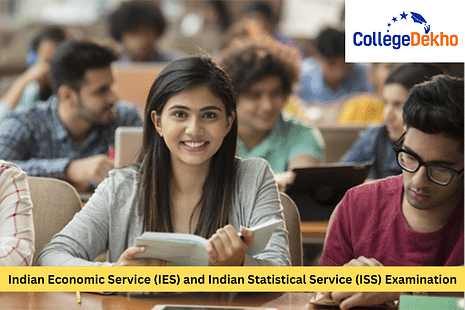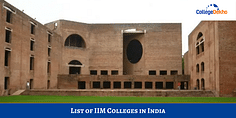The Indian Economic Service (IES) and Indian Statistical Service (ISS) Examination is expected to be conducted on June 21, 2024. The application process will begin on April 10, 2024. Check out all the details of the UPSC IES and ISS examination in this article.
- UPSC IES and ISS Examination 2024 Highlights
- UPSC IES and ISS Examination 2024 Important Dates
- UPSC IES and ISS Examination 2024 Time-Table
- UPSC IES and ISS Examination 2024 Application Process
- UPSC IES and ISS Examination 2024 Eligibility
- UPSC IES and ISS Examination 2024 Admit Card
- UPSC IES and ISS Examination 2024 Exam Pattern
- UPSC IES and ISS Examination 2024 Syllabus
- UPSC IES and ISS Examination 2024 Exam Centres
- UPSC IES and ISS Examination 2024 Answer Key
- UPSC IES and ISS Examination 2024 Result
- UPSC IES and ISS Examination 2024 Cutoff
- UPSC IES and ISS Examination 2024 Selection Process
- Faqs

The IES and ISS examination is scheduled to be conducted on June 21, 2024. The Indian Economic Service (IES) and Indian Statistical Service (ISS) examination is a very popular exam among students in India that is conducted by the Union Public Service Commission (UPSC). The official notification will be released on April 10, it is expected that the application form will also be released on the same date and interested candidates can submit their applications by April 30, 2024. Candidates who are aspiring to appear for the IES ISS entrance examination can visit the official website, upsc.gov.in to check out the notification and all other details.
To appear for the UPSC IES and ISS examinations, candidates must be between the age group of 21 to 30 years. Those who are thinking of applying for the Junior Time Scale in Indian Economic Service, candidates must be post-graduate in Applied Economics/ Econometrics /Economics/ Business Economics/ from a University or Foreign University approved by the Central Government. For the Indian Statistical Service post, aspirants need to have a bachelor's degree or Master's degree with Mathematical Statistics/ Applied Statistics/ Statistics/ as one of the subjects from a University or equivalent. The written test will be conducted separately for the Indian Economic Service (IES) and the Indian Statistical Service (ISS). Those passing the written exam will have to appear for viva voce. The students will be allotted posts in IES and ISS based on their performance in the written test and the interview or viva voce rounds.
The ISS along with IES is the administrative interministerial civil service that falls under Group A of the executive branch of the Central Civil Services, GOI (the Government of India). Individuals are requested to carefully read the rules and regulations notified by the Government (Ministry of Statistics and Programme Implementation) for the Indian Economic Service (IES) or Indian Statistical Service (ISS) examination. The eligibility criteria play a major role in the examination, so students are advised to check the eligibility conditions thoroughly before filling up the application form.
Candidates interested in the Indian Economic Service (IES) and Indian Statistical Service (ISS) examination are requested to go through this article to get all the details on the dates, eligibility, syllabus, etc.
UPSC IES and ISS Examination 2024 Highlights
Before getting into the details of the UPSC Indian Economic Service (IES) and Indian Statistical Service (ISS) Examination 2024, take a quick look at the table to get an overview of the exam.
Examination Name | Indian Economic Service (IES)/ Indian Statistical Service (ISS) Examination |
|---|---|
Conducting Authority | UPSC (Union Public Service Commission) |
Exam Frequency | Once a Year |
Examination Level | National Level |
Conducted For | Recruitment for vacancies in the IES and ISS |
Examination Mode | Offline, Pen and paper-based |
Duration of the examination | 3 days mostly |
Application Mode | Online |
Key Stages Involved | Written Test and Interview |
Minimum Education Qualification Required | A Postgraduate Degree |
Number of attempts | 6 |
Vacancies | ISS - 33 (tentative) IES - 18 (tentative) |
Age Limit | 21 - 30 Years |
Official Website | www.upsc.gov.in |
UPSC IES and ISS Examination 2024 Important Dates
As per the dates we know, we have prepared the table consisting of the UPSC IES and ISS Examination 2024 dates. The official notification has not yet been released and the table will be again updated after the notification.
Events | Dates |
|---|---|
Notification Release Date | April 10, 2024 |
Commencement of Online Application | April 10, 2024 |
Deadline for Online Application | April 30, 2024 |
Correction of Application Form | To be Notified |
Admit Card Release Date | June 2024 |
Examination Date | June 21, 2024 |
Declaration of Result | To be Notified |
UPSC IES and ISS Examination 2024 Time-Table
After the official notification, the UPSC Indian Economic Service (IES) and Indian Statistical Service (ISS) Examination 2024 timetable will be updated. Till then, aspirants can check out the exam day, date and time in the table below:
Subject | Date & Day | Exam Time |
|---|---|---|
General English (Descriptive) | To be Notified | To be Notified |
General Studies (Descriptive) | To be Notified | To be Notified |
General Economics I (Descriptive) | To be Notified | To be Notified |
Statistics I (Objective) | To be Notified | To be Notified |
General Economics II (Descriptive) | To be Notified | To be Notified |
Statistics II (Objective) | To be Notified | To be Notified |
General Economics III (Descriptive) | To be Notified | To be Notified |
Statistics III (Descriptive) | To be Notified | To be Notified |
Indian Economics (Descriptive) | To be Notified | To be Notified |
Statistics IV (Descriptive) | To be Notified | To be Notified |
Also Read:List of UPSC Civil Services Posts with Salary
UPSC IES and ISS Examination 2024 Application Process
For the UPSC IES and ISS Examination 2024 application process, candidates have to do One-Time Registration (OTR) for examinations of UPSC. The application process will be conducted online and candidates have to first register themselves and then fill up the application form. Find below the application process for the Indian Economic Service (IES) and Indian Statistical Service (ISS) Examination:
- Firstly visit the official website of UPSC, upsc.gov.in.
- They have to then complete the registration process and login again by using their OTR ID, email ID or mobile number to verify the already registered OTR application.
- Fill in all the details after logging in.
- Upload the necessary documents as per their specifications.
- Select your preferred exam centre from the drop-down menu.
- Pay the application fees.
- Preview and submit the IES and ISS Examination 2024 application form.
Documents Required for UPSC IES and ISS Examination 2024 Application
The necessary documents that are required during the UPSC Indian Economic Service (IES) and Indian Statistical Service (ISS) Examination 2024 application process are:
- A valid mobile phone number and registered email ID.
- Scanned photograph and signature of the candidate.
- Aadhaar Card or valid photo ID proof.
- Academic mark sheets.
- Debit card/ credit card for fee payment.
Document Specifications for UPSC IES and ISS Examination 2024 Application
The documents required to submit during the UPSC Indian Economic Service (IES) and Indian Statistical Service (ISS) Examination 2024 application process need to follow some size requirements, which are as follows:
Document | Format | Size |
|---|---|---|
Photograph | .jpg | 20 KB to 40 KB |
Signature | .jpg | 20 KB to 40 KB |
UPSC IES and ISS Examination 2024 Application Fee
To apply for the UPSC Indian Economic Service (IES) and Indian Statistical Service (ISS) Examination 2024, some candidates have to pay an application fee and some are exempted from paying the fee. Find out the details below:
Application Fee for Unreserved, OBC and EWS Category | INR 200 |
|---|---|
Fee Amount for SC/ ST/ Women | Exempted |
Means for Online Payment | Internet Banking of SBI/ RuPay/ Credit Card/ Debit Card/ Master Cast/ Visa Card |
Means for Offline Payment | From any SBI Branch |
Also Read:How to Qualify UPSC Civil Services Exam 2024 in First Attempt?
UPSC IES and ISS Examination 2024 Eligibility
Check out the detailed eligibility criteria for the UPSC Indian Economic Service (IES) and Indian Statistical Service (ISS) Examination 2024 below.
Nationality
- You must be a citizen of India or Nepal or Bhutan.
- You must be a Tibetan Refugee who moved to India before 1st January 1962 to permanently settle here.
- You must be a person of Indian origin who migrated from Burma, Pakistan, East African Countries of Kenya, Sri Lanka, Uganda, Zambia, the United Republic of Tanzania, Zaire, Malawi, Vietnam or Ethiopia with intentions of permanently settling here.
Age Limit
The minimum age required to appear for the UPSC IES and ISS Examination 2024 is 21 years and the maximum age limit is 30 years. Check out the age relaxation given below for different categories of students:
Category | Age Relaxation |
|---|---|
OBC | 3 years |
Defense Services Personnel disabled in operations during hostilities with any foreign country or in a disturbed area | 3 years |
SC/ ST | 5 years |
Domicile of Jammu & Kashmir | 5 years |
Ex-servicemen including Commissioned Officers and ECO/SSCO | 5 years |
PwBD | 10 years |
Educational Qualification
Educational qualifications for IES are mentioned below.
- You must hold a postgraduate degree in Business Economics or Economics or Econometrics or Applied Economics.
- The postgraduate degree must have been issued by a university recognised by the state or central legislature.
Educational qualifications for ISS are mentioned below.
- You must hold a bachelor’s degree in Mathematical Statistics or Statistics or Applied Statistics.
OR
- You must hold a Master’s degree in Mathematical Statistics or Statistics or Applied Statistics from a recognised university.
UPSC IES and ISS Examination 2024 Admit Card
The UPSC Indian Economic Service (IES) and Indian Statistical Service (ISS) Examination 2024 admit card will be released by UPSC on the official website. Candidates can download the admit card by entering their roll number or registration ID and date of birth. Students who are not able to get their admit card should inform UPSC three weeks before the examination. The admit card for IES and ISS Examination 2024 will contain the candidate’s name, signature, time, photograph, exam centre and guidelines for the exam. Those who will clear the written examination will get an admit card for the viva voce round. The admit cards will be released separately for the written exam and viva voce online. To get the admit card, the candidate has to fill up the application form correctly.
Check below the details given on the IES and ISS Examination admit card:
- Candidate’s roll number
- Candidate’s name
- Registration number
- Candidate’s photograph
- Reporting time
- Category of the candidate
- Candidate’s signature
- Exam time
- Date of Examination
- Address of examination centre
UPSC IES and ISS Examination 2024 Exam Pattern
The students eagerly waiting for the UPSC Indian Economic Service (IES) and Indian Statistical Service (ISS) Examination 2024 must know that the IES and ISS examination is conducted for 3 days. IES and ISS Examination includes six subjects, each with a different time duration and maximum marks. Check out the detailed exam pattern below.
IES Examination Pattern
Find below the detailed pattern of the IES examination 2024:
Subjects | Maximum Marks | Exam Duration |
|---|---|---|
General English | 100 | 3 hours |
General Studies | 100 | 3 hours |
General Economics - I | 200 | 3 hours |
General Economics - II | 200 | 3 hours |
General Economics - III | 200 | 3 hours |
Indian Economics | 200 | 3 hours |
Total | 1000 | |
ISS Examination Pattern
The detailed pattern for the ISS examination 2024 is mentioned below:
Subjects | Maximum Marks | Exam Duration |
|---|---|---|
General English | 100 | 3 hours |
General Studies | 100 | 3 hours |
Statistics - I (Objective Type) | 200 | 2 hours |
Statistics - II (Objective) | 200 | 2 hours |
Statistics - III (Subjective) | 200 | 3 hours |
Statistics - IV (Subjective) | 200 | 3 hours |
UPSC IES and ISS Examination 2024 Syllabus
The UPSC Indian Economic Service (IES) and Indian Statistical Service (ISS) Examination 2024 contain General Studies and General English syllabus that are common subjects for the IES and ISS Examination.
General English | Reading Comprehension Vocabulary Para jumbles Gap Filling Multiple Meaning/Error Spotting Active and Passive Voice Direct and Indirect Speech |
|---|---|
General Studies | Questions based on general knowledge, History Indian polity. Geography. Constitution of India Current affairs Current events and their effects on everyday life |
Let’s find out the syllabus for UPSC Indian Economic Service (IES) below:
GENERAL ECONOMICS – I | |
|---|---|
PART – A | |
Theory of Consumer's Demand | Cardinal utility Analysis: Marginal utility and demand, Consumer's surplus, Indifference curve, Analysis and utility function, Price income and substitution effects, etc. |
Theory of Production | Factors of production and production function, Forms of Production Functions, Translog production function, Returns to scale and Returns to factors of production, Partial Equilibrium versus General Equilibrium approach, etc. |
Theory of Value | Pricing under different market structures, Marshallian and Walrasian stability analysis, Pricing with incomplete information and moral hazard problems, etc. |
Theory of Distribution | Neo classical distribution theories, Marginal productivity theory of the determination of factor prices, Macrodistribution theories of Ricardo, Marx, Kaldor, Kalecki, etc. |
Welfare Economics | Inter-personal comparison and aggression problem, Public goods and externalities, Divergence between social and private welfare, Pareto optimality, etc. |
Part B: Quantitative Methods in Economics | |
Mathematical Methods in Economics | Differentiation and Integration and their application in economics, Optimisation techniques, Sets, Matrices and their application in economics, etc. |
Statistical and Econometric Methods | Measures of central tendency and dispersions, Correlation and Regression, Time series, Index numbers, Sampling of curves based on various linear and non-linear functions, Lorenz curve and Gini coefficient, etc. |
GENERAL ECONOMICS – II | |
Economic Thought | Mercantilism Physiocrats, Classical, Marxist, Neo-classical, Keynesian and Monetarist schools of thought. |
Concept of National Income and Social Accounting | Measurement of National Income, Inter relationship between three measures of national income in the presence of Government sector and International transactions. Environmental considerations, Green national income. |
Theory of Employment, Output, Inflation, Money and Finance | The Classical theory of Employment and Output and neo-classical approaches, Equilibrium, analysis under classical and neo-classical analysis, Keynesian theory of Employment and output, Post Keynesian developments, The inflationary gap; Demand pull versus cost push inflation, Philip's curve and its policy implication, Classical theory of Money, the Quantity theory of Money, etc. |
Financial and Capital Market | Finance and economic development, financial markets, stock market, gift market, banking and insurance. Equity markets, Role of primary and secondary markets and efficiency, Derivatives markets; Future and options. |
Economic Growth and Development | Concepts of Economic Growth and Development and their measurement: characteristics of less developed countries and obstacles to their development – growth, poverty and income distribution. |
International Economics | Gains from International Trade, Terms of Trade, policy, Theory of Tariffs- Regional Trade Arrangements, etc. |
Balance of Payments | Disequilibrium in Balance of Payments, Mechanism of Adjustments, Foreign Trade Multiplier, Exchange Rates, Import and Exchange Controls and Multiple Exchange Rates, IS-LM Model and Mundell |
Global Institutions | UN agencies dealing with economic aspects, the role of Multilateral Development Bodies (MDBs), such as the World Bank, IMF and WTO, Multinational Corporations, G-20. |
GENERAL ECONOMICS – III | |
Public Finance | Theories of taxation, public expenditure policy and social cost-benefit analysis, criteria of public investment decisions, social rate of discount, shadow prices of investment, unskilled labour and foreign exchange, Budgetary deficits, Theory of public debt management, etc. |
Environmental Economics | Environmentally sustainable development, Rio Process 1992 to 2012, Green GDP, UN Methodology of Integrated Environmental and Economic Accounting, Theories of exhaustible and renewable resources, International environmental agreements, RIO Conventions, Climatic change problems, Kyoto Protocol, UNFCC, Bali Action Plan, Agreements up to 2017, etc. |
Industrial Economics | Market structure, conduct and performance of firms, product differentiation and market concentration, monopolistic price theory and oligopolistic interdependence and pricing, entry preventing pricing, micro level investment decisions, etc. |
State, Market and Planning | Planning in a developing economy, Planning regulation and market, Indicative planning, Decentralised planning. |
INDIAN ECONOMICS | |
History of development and planning | Alternative development strategies, the post-1991 globalisation strategies based on stabilization and structural adjustment packages: fiscal reforms, financial sector reforms and trade reforms. |
Federal Finance | Constitutional provisions relating to fiscal and financial powers of the States, Financial aspect of Sarkaria Commission Report, etc. |
Budgeting and Fiscal Policy | Tax, expenditure, budgetary deficits, pension and fiscal reforms, Public debt management and reforms, Fiscal Responsibility and Budget Management (FRBM) Act, etc. |
Poverty, Unemployment and Human Development | Estimates of inequality and poverty measures for India, appraisal of Government measures, India’s population policy and development, etc. |
Agriculture and Rural Development Strategies | Technologies and institutions, land relations and land reforms, rural credit, modern farm inputs and marketing— price policy and subsidies; commercialisation and diversification, Rural development programmes include poverty alleviation programmes, the development of economic and social infrastructure and the New Rural Employment Guarantee Scheme. |
India’s experience with Urbanisation and Migration | Different types of migratory flows and their impact on the economies of their origin and destination, the process of growth of urban settlements, etc. |
Industry | Strategy of industrial development, Competition policy, Sources of industrial finances, etc. |
Labour | Urban labour market and informal sector employment, Report of National Commission on Labour, Social issues relating to labour e.g. Child Labour, Bonded Labour International Labour Standard and its impact, etc. |
Foreign Trade | Salient features of India’s foreign trade, composition, direction and organisation of trade, etc. |
Money and Banking | Financial sector reforms, Organisation of India’s money market, changing roles of the Reserve Bank of India, etc. |
Check out the syllabus for UPSC Indian Statistical Service (ISS) below:
STATISTICS-I (Objective Type) | |
|---|---|
Probability | Classical and axiomatic definitions of Probability and consequences, Law of total probability, Conditional probability, Bayes' theorem and applications, etc |
Statistical Methods | Measures of location, dispersion, skewness and kurtosis, Bivariate and multivariate data, Association and contingency, Curve fitting and orthogonal polynomials, Bivariate normal distribution, etc. |
Numerical Analysis | Finite differences of different orders, Concept of interpolation and extrapolation, Numerical differentiation, Summation of Series, Numerical solutions of differential equations, etc. |
Computer Application and Data Processing | Basics of Computer, Basics of Programming, etc. |
STATISTICS- II (Objective Type) | |
Linear Models | Theory of linear estimation, Gauss, etc. |
Statistical Inference and Hypothesis Testing | Characteristics of a good estimator, Hypothesis testing, etc. |
Official Statistics | National and International Official Statistical System, National Statistical Organization, National Statistical Commission, Index Numbers, Sector Wise Statistics, National Accounts, Population Census, etc. |
STATISTICS- III (Descriptive Type) | |
Sampling Techniques | Concept of population and sample, need for sampling, complete enumeration versus sampling, Ratio, product and regression methods of estimation, estimation of population mean, evaluation of Bias and Variance to the first order of approximation, comparison with simple random sampling, etc. |
Econometrics | Nature of econometrics, the general linear model (GLM) and its extensions, ordinary least squares (OLS) estimation and prediction, etc. |
Applied Statistics | Index Numbers, Time Series Analysis, Laspeyre's, Paasches’, Marshal Edgeworth and Fisher index numbers; chain base index number, tests for index numbers, Construction of index numbers of wholesale and consumer prices, Income distribution-Pareto and Engel curves, Concentration curve, Methods of estimating national income, Inter-sectoral flows, Inter-industry table, Role of CSO. Demand Analysis, etc. |
STATISTICS- IV (Descriptive Type) | |
Operations Research and Reliability | Definition and Scope of Operations Research, Transportation and assignment problems, etc. |
Demography and Vital Statistics | Sources of demographic data, census, Measurement of Mortality, etc. |
Survival Analysis and Clinical Trial | Concept of time, order and random censoring, likelihood in the distributions, etc. |
Quality Control | Statistical process and product control, Economic design of X-bar chart, etc. |
Multivariate Analysis | Multivariate normal distribution and its properties, Random sampling from multivariate normal distribution, etc. |
Design and Analysis of Experiments | Analysis of variance for one-way and two-way classifications, Need for design of experiments, etc. |
Computing with C and R | Basics of C, Array of Structures, Statistics Methods and Techniques in R, etc. |
For the detailed syllabus, candidates can check the links given below:
UPSC IES and ISS Examination 2024 Exam Centres
UPSC Indian Economic Service (IES) and Indian Statistical Service (ISS) Examination is a national-level exam that is conducted at different centres across the country. The candidates will be given the names of the exam centres in advance. So, while filling up the application form, candidates can select the exam centre of their choice. The exam centres for the UPSC IES and ISS Examination 2024 are given below:
Ahmedabad | Bhopal | Chennai |
|---|---|---|
Shillong | Kolkata | Delhi |
Bengaluru | Jaipur | Hyderabad |
Shimla | Dispur | Jammu |
Allahabad | Cuttack | Patna |
Mumbai | Chandigarh | Lucknow |
Thiruvananthapuram | ||
UPSC IES and ISS Examination 2024 Answer Key
The answer key for UPSC Indian Economic Service (IES) and Indian Statistical Service (ISS) Examination 2024 will be released by UPSC on its official website. The candidates who have appeared for the IES and ISS Examination can download the answer key. The answer key will contain correct answers to the questions asked in the examination. Candidates can use the answer key to match their answers and assess their performance in the exam.
UPSC IES and ISS Examination 2024 Result
Based on the result of the written part of the UPSC Indian Economic Service (IES) and Indian Statistical Service (ISS) Examination 2024, UPSC will release a list containing the roll numbers and names of the candidates who have cleared the first round and have qualified for Interview/ Personality Test. The result will be released online and candidates who want to check IES and ISS examination results will have to log into the official website of UPSC using valid credentials. The final result will also be released by the commission for candidates who qualify for the viva voce.
UPSC IES and ISS Examination 2024 Cutoff
The cutoff is released separately for the UPSC Indian Economic Service (IES) and Indian Statistical Service (ISS) Examination 2024 for the written exam and viva voce. The cutoff is released category-wise and in three phases; cutoff for written exam, minimum qualifying cutoff and final cutoff.
UPSC IES Cutoff
According to the last year’s cutoff, candidates should try to secure the minimum qualifying marks fixed by the commission which was 15% for OBC and General category candidates. The cutoff for the written exam was calculated out of 800 marks for 4 Economics Papers and the cutoff for all 6 papers was calculated out of 1000 marks. The final cutoff was based on marks secured by the last recommended candidate and calculated out of 1200 marks.
UPSC ISS Cutoff
Based on the previous year's cutoff, the candidates need to get the minimum qualifying marks fixed by UPSC. The minimum qualifying cutoff for General, OBC, ST and PH candidates was 10%. The marks of all four Statistics papers will be calculated out of 800 marks and the cutoff for all 6 papers was calculated out of 1000 marks. The final cutoff of ISS Examination was calculated out of 1200 marks.
UPSC IES and ISS Examination 2024 Selection Process
The candidates are selected for the UPSC Indian Economic Service (IES) and Indian Statistical Service (ISS) Examination 2024 based on two steps conducted by UPSC. Two of the steps include a Written Examination and an Interview/ Personality Test Round. Candidates who score well in the written exam are called for the interview round. Candidates have to clear both rounds to get selected for the positions. The final selection for the post will be done after eligibility verification.
Related Articles
Click on the links given below to know more:
Hope the above-mentioned information helped you understand the exam better. In case of any query regarding the same, leave us your questions in the QnA section of CollegeDekho.

















Similar Articles
Government Jobs for Commerce Students with High Salary
Best Courses after 12th for Commerce Students
CUET 2024 Teaching Aptitude Syllabus (Released): Check Topics, Pattern, Download PDF
CUET Accountancy Syllabus 2024 (Released): Check Topics, Pattern, Download PDF
List of Top Government Jobs after B.Com: Explore Your Options
B.Com (Hons) vs Economics (Hons): Which is the Better Course?